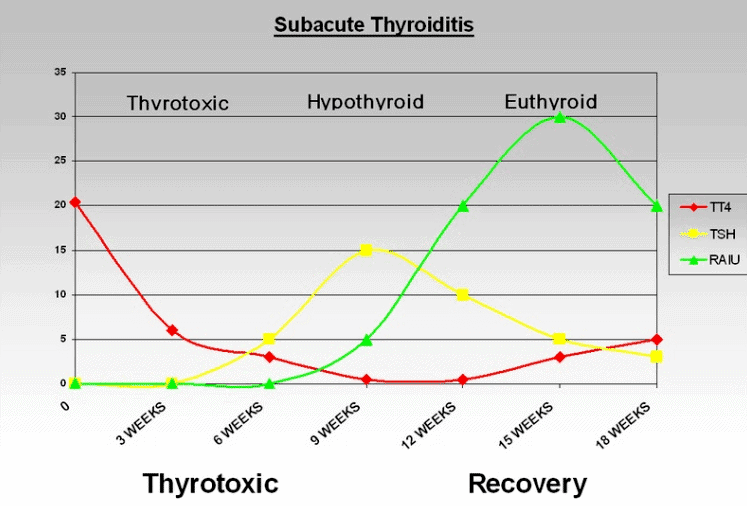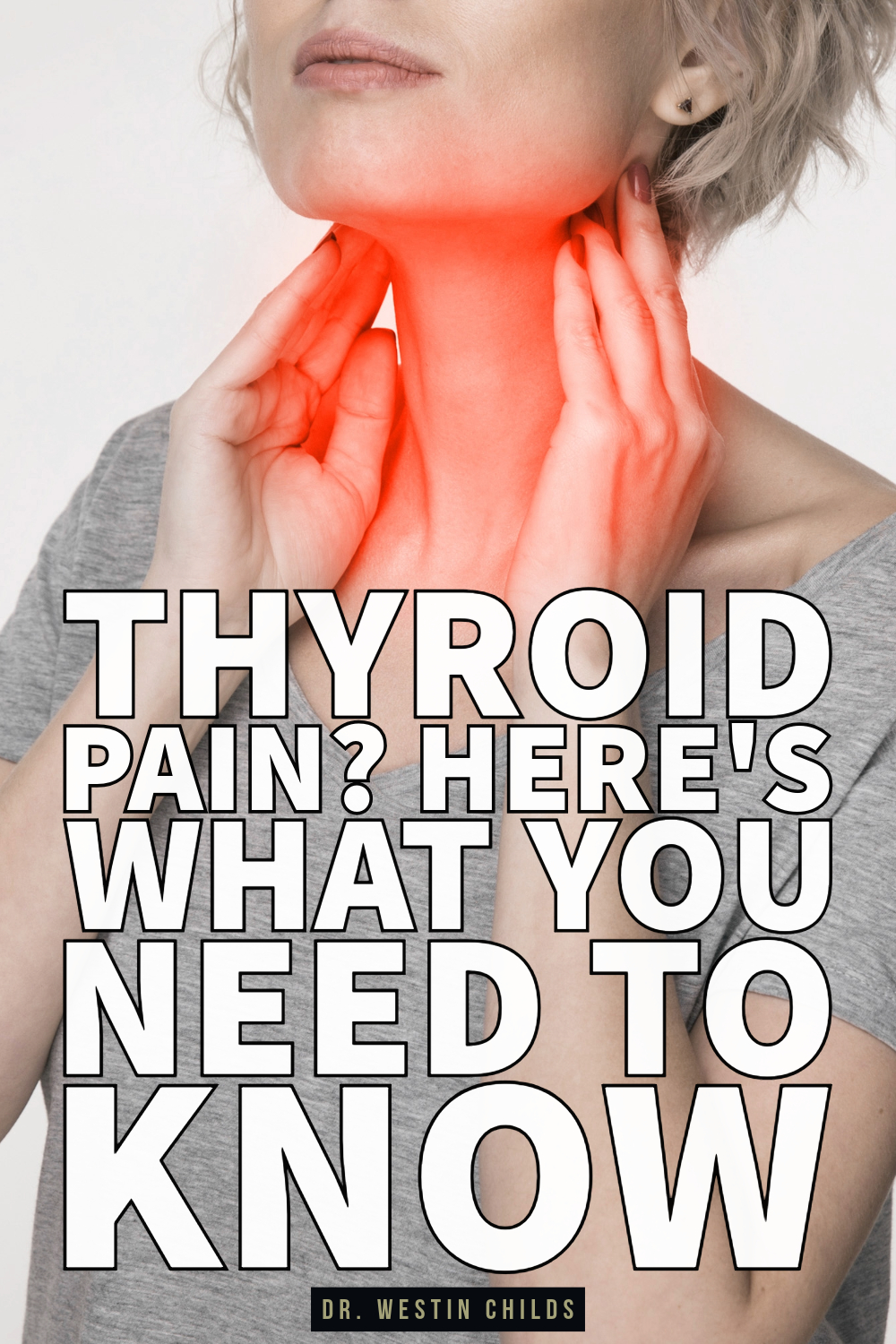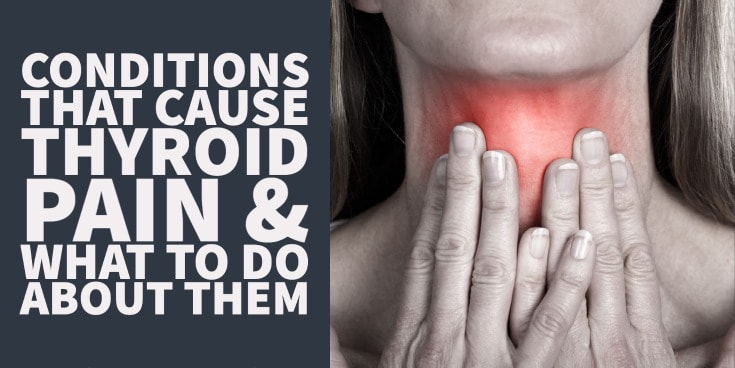Believe it or not, most people who have thyroid problems never experience thyroid pain.
This is both good and bad.
Good in the sense that it’s an uncommon condition and bad in the sense that it’s never normal.
If you’re experiencing pain in or around the base of your neck (right where your thyroid gland is located), it’s likely due to one of these conditions:
DOWNLOAD FREE RESOURCES
Foods to Avoid if you Have Thyroid Problems:
I’ve found that these 10 foods cause the most problems for thyroid patients. Learn which foods you should avoid if you have thyroid disease of any type.
The Complete List of Thyroid Lab tests:
The list includes optimal ranges, normal ranges, and the complete list of tests you need to diagnose and manage thyroid disease correctly!
#1. Subacute Thyroiditis
Subacute thyroiditis is the most common cause of neck pain among all conditions of the thyroid gland (3).
Any condition which results in inflammation of the thyroid gland may potentially result in pain in that same area.
This particular condition is usually the result of an infection but it can be an infection from a virus or bacteria or fungus.
The most common subtype of subacute thyroiditis is known as subacute granulomatous thyroiditis which is typically caused by a viral infection.

The good news is that viral infections tend to be cleared up by the immune system over time and without any intervention (all you need is rest, some anti-inflammatory supplements or medicines, and time).
Other forms of thyroiditis, such as those caused by bacteria or fungus (4), may require more heavy-duty medications such as antibiotics or antifungals.
Subacute thyroiditis, despite it being the most common cause of neck pain, is actually not very common at all.
This means that you can usually identify the type of thyroiditis that you have simply by whether or not pain is present in your thyroid gland.
If you have pain then the chances are high that your condition is subacute thyroiditis.
If you do not have pain, then the chances are high that your thyroiditis is caused by some other cause.
#2. Hashimoto’s Thyroiditis
Hashimoto’s thyroiditis is the most common cause of thyroid inflammation and it is caused by an autoimmune attack on the thyroid gland.
You would think that because Hashimoto’s is so common and because it results in inflammation and damage to the thyroid gland it would present with thyroid pain.
The truth is that MOST patients with Hashimoto’s thyroiditis do NOT have any pain, but that doesn’t mean that all patients will be pain-free.

If you have thyroid pain you can easily test for Hashimoto’s thyroiditis by checking simple thyroid antibodies on routine bloodwork.
#3. Lymphadenopathy
Lymphadenopathy refers to the enlargement or swelling of your lymph nodes.
Sometimes, the enlargement of these lymph nodes can be confused for thyroid pain.
The best way to differentiate between enlarged tender lymph nodes and pain in your thyroid gland is located.
The thyroid gland (normally) sits in the FRONT of your neck whereas your lymph nodes tend to follow down the sides of your neck and underneath the jaw/chin.
Some thyroid conditions, such as thyroid cancer or thyroid infection, may result in both thyroid pain and enlargement of your lymph nodes.
#4. Thyroid Cancer
Thyroid cancer generally does NOT cause pain but it can in some instances.
Pain related to thyroid cancer is rare but it should always be thought of.
#5. Postpartum Thyroiditis
Postpartum thyroiditis is a condition of the thyroid gland which develops after pregnancy.
Sometimes this condition can also present with pain in the thyroid gland (9).
You can identify postpartum thyroiditis because it usually is associated with OTHER symptoms (both hyperthyroid and hypothyroid symptoms) and because it tends to come after pregnancy.
Some of the symptoms of postpartum thyroiditis can mimic postpartum depression so it’s important to diagnose this condition if you feel it is present.
You can figure out if you have it by going to your Doctor and getting simple routine thyroid lab tests such as the TSH, Free T3, Free T4, and thyroid antibodies.
Treatment Options & What to Do Next
Treating thyroid pain should focus on identifying and diagnosing the underlying cause.
Each treatment, for the conditions listed above, may be different.
Some conditions, such as postpartum thyroiditis and subacute thyroiditis, may go away on their own with time and simple anti-inflammatory medications.
On the other hand, some conditions, such as thyroid cancer and Hashimoto’s thyroiditis, are not likely to go away without serious treatment or intervention.
In most cases, you will probably need to take something to cool off the inflammation in your thyroid gland to help reduce the pain.
Certain supplements such as Alpha lipoic acid (10), turmeric (11), or fish oil may help (12).
Other over-the-counter medications like NSAIDs may also be effective (13).
It’s important to note that the treatment for thyroid pain will probably not alter the other symptoms that we discussed previously.
Treating these symptoms may require thyroid hormone medication or other medications to temporarily blunt thyroid hormone.
Conclusion
Thyroid pain is a relatively uncommon symptom among patients who have thyroid problems.
Having said that, it’s still a serious condition that needs to be evaluated by a physician if present.
Once you have a diagnosis you can hone in on treatment options.
Thyroid pain is often accompanied by symptoms related to changes in thyroid hormone in your body.
These symptoms may range from fatigue to weight gain to hair loss and more.
Most of the time, thyroid pain is a sign of inflammation related to an infection or your immune system which will fade on its own over time (but not always).
When in doubt make sure that you touch base with your Doctor to get the right lab tests to figure out what is going on in your body.
Now I want to hear from you:
Are you suffering from thyroid pain?
Do you know why you have it?
Have you been able to find relief?
Are you also experiencing the symptoms of thyroid hormone dysfunction?
Leave your comments below!
Scientific References
#1. https://www.ncbi.nlm.nih.gov/books/NBK470452/
#2. https://www.ncbi.nlm.nih.gov/pubmed/1352658
#3. https://www.ncbi.nlm.nih.gov/books/NBK279084/
#4. https://www.ncbi.nlm.nih.gov/pubmed/6338569
#5. https://www.ncbi.nlm.nih.gov/pmc/articles/PMC3341442/
#6. https://www.ncbi.nlm.nih.gov/pmc/articles/PMC3354858/
#7. https://www.ncbi.nlm.nih.gov/books/NBK256/
#8. https://www.ncbi.nlm.nih.gov/pmc/articles/PMC3079917/
#9. https://www.ncbi.nlm.nih.gov/pmc/articles/PMC2429538/
#10. https://www.ncbi.nlm.nih.gov/pubmed/21908204
#11. https://www.ncbi.nlm.nih.gov/pmc/articles/PMC5664031/
#12. https://www.ncbi.nlm.nih.gov/pmc/articles/PMC3257651/
#13. https://www.ncbi.nlm.nih.gov/pmc/articles/PMC3996955/


Leave a Reply to Dr. Westin Childs Cancel reply